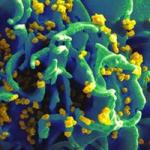
Nicolas Wentzensen, M.D., Ph.D.
Senior Investigator
Trans-Divisional Research Program
NCI/DCEG
Research Topics
I am leading a research program focused on clinical epidemiology of gynecological cancers that builds on understanding of etiology and natural history of cancers to address important clinical and public health problems. My research includes a spectrum of epidemiological approaches, including descriptive epidemiology and etiologic studies to the extent that they address important translational questions, as well as natural history studies, systematic reviews, biomarker discovery and validation, and risk estimation. I have special expertise in human papillomavirus biology, the p16/Rb pathway, gene methylation, and molecular profiling of cancers. I have a strong interest in methods development, particularly for absolute risk assessment and for assay evaluation. A focus of my work is on moving etiologic discoveries into clinical applications. Several of my studies directly affect public health decisions and clinical practice.
Clinical Epidemiology
Important goals of my clinical epidemiology research include the characterization of multi-step carcinogenesis, the development of risk prediction models, and the evaluation of new targeted sampling methods for identification of cancer precursors and invasive cancers. We leverage data from electronic medical records and biospecimen collections to enrich our carefully designed epidemiological studies. Our successful work on HPV-related cancers exemplifies how we move from etiologic discovery and understanding of natural history and multi-step carcinogenesis to clinical applications and risk estimation. I have extended these approaches to other gynecological cancers.
Cervical Cancer and Other HPV-related Cancers
Over the last decade, we have established a multi-step carcinogenesis model with HPV infection, precancer, and cancer as central stages. This model underlies my activities on etiology, discovery, and translation. A major focus is on understanding the transition probabilities between disease stages and identifying biomarkers for screening and management. My work in cervical cancer has important clinical implications and directly impacts guidelines efforts.
In the Study to Understand Cervical Cancer Early Endpoints and Determinants, my goal is to comprehensively assess biomarkers of risk for progressive cervical neoplasia, and thus develop a new set of biomarkers that can distinguish those at highest risk of cervical cancer from those with benign infection. In the Biopsy Study to Improve Detection of Cervical Precancer, my goals are to study cervical disease on the lesion level, to optimize criteria for biopsy placement, and to analyze the incremental benefit of taking multiple biopsies. In the IRIS Cohort in Kaiser Permanente Northern California, I study important etiologic questions related to HPV carcinogenesis and I conduct large comparative evaluations of biomarkers and risk assessment among 80,000 women enrolled in an organized screening program representing 1.5 Million women. In STRIDES, I am evaluating natural history and risk prediction in a population in Mississippi. In the Cervical Cancer Screening Among HIV-Infected Women in India and the Anal Precancer and Cancer in HIV-Positive Men (Anal Cancer Screening Study), I am focusing on evaluation of biomarkers and colposcopy/anoscopy to improve detection of HPV-related diseases in HIV-infected populations.
Ovarian Cancer
Ovarian cancer has presented many challenges for clinical translation related to profound biologic heterogeneity, late presentation, and lack of effective screening approaches. Recent advances in understanding ovarian cancer biology, the identification of putative cancer precursors, as well as novel approaches to localized sampling, put ovarian cancer back in the focus of clinical epidemiology. Ovarian cancers are etiologically distinct tumors with different sites of origin that manifest on the ovaries, in fallopian tubes, or in the peritoneum. I seek to understand etiologic heterogeneity by studying risk factor associations and circulating biomarkers in histologic subtypes. I am particularly interested in the role of inflammation in ovarian carcinogenesis, since it could lead to new interventions to prevent or control inflammation. I am pursuing several translational goals to develop and critically assess ovarian cancer risk prediction integrating risk factors, genetics, and biomarkers, to characterize ovarian cancer precursors, and to study new sampling strategies.
Together with extramural researchers, I established the Ovarian Cancer Cohort Consortium (OC3) to conduct well-powered studies of risk factors and biomarkers by histologic subtypes. I am leading tissue-based profiling studies in the Ovarian Cancer Case-Control Study in Poland and in PLCO to improve the understanding of etiologic heterogeneity and to identify cells of origin of ovarian cancers based.
I am pursuing a novel approach to ovarian sampling and characterizing ovarian cancer precursors in collaboration with Magee’s Women’s Hospital. Directed brush samples from the ovarian surface and the fallopian tubes are collected in women undergoing benign oophorectomy, in women with BRCA mutations, and in women with ovarian cancer. This study will develop new approaches for identification and molecular characterization of ovarian cancer precursors, including somatic mutation testing, and will serve as a resource for biomarker discovery.
Endometrial Cancer
My main focus on endometrial cancer research is to characterize cancer precursors and to develop early detection biomarkers. In a study to evaluate biomarkers in samples collected using endometrial brushings and intravaginal tampons, we identified several candidate markers that showed good performance to identify women with endometrial cancer. I am now conducting a large prospective study to conduct risk prediction studies and evaluate biomarkers for endometrial cancers and cancer precursors.
Biography
Dr. Wentzensen received an M.D. in 2000 and a Ph.D. in Applied Tumor Biology in 2007, both from the University of Heidelberg. He conducted research in molecular biology, molecular pathology, and molecular epidemiology at the Department of Surgery and at the Institute of Pathology, University of Heidelberg. He built a research group focusing on cervical cancer biomarker discovery and validation and established a diagnostic laboratory for cervical cancer screening. In 2009 he earned a Master of Science in Epidemiology from the University of Mainz. Dr. Wentzensen joined DCEG as a visiting fellow in 2007, became a tenure-track investigator in 2009, and was awarded scientific tenure by the NIH and appointed senior investigator in 2013. In 2015 he joined the Clinical Genetics Branch as Deputy Chief and head of the newly formed Clinical Epidemiology Unit (CEU) within CGB.
Dr. Wentzensen’s research is focused on clinical epidemiology of gynecological cancers. His research has been highly recognized internationally. His medical doctorate thesis on human papillomavirus integration was awarded summa cum laude. He has received multiple research awards from the University of Heidelberg and several awards for presentations at international scientific meetings, including an AACR scholar-in-training award. Since joining DCEG, Dr. Wentzensen has won two intramural research awards, an NCI Director’s Intramural Innovation Award, two NIH Awards of Merit, a Research Highlights Award, two NCI Director's Awards, and the NCI Outstanding Mentor Award.
Dr. Wentzensen has served on several panels of the U.S. Food and Drug Administration and as an expert for the National Academy of Medicine. He has played central roles in recent updates of cervical cancer screening and management guidelines since 2012, including the Practice Improvement of Cervical Screening and Management effort sponsored by the American Cancer Society, ASCCP, and the American Society for Clinical Pathology, as well as the ASCCP cervical cancer management guidelines efforts in 2013 and 2019. He provided scientific leadership to the first U.S. colposcopy standards developed by ASCCP. He is now leading a multi-institutional effort on Enduring Guidelines that will regularly update cervical cancer screening and management guidelines. For his contributions to these efforts, he was awarded several ASCCP Awards, including the ASCCP Distinguished Scientific Award in 2018, the Society's highest honor. He has also helped develop several international guidelines, including the WHO cervical cancer screening guidelines, and he is co-chair of the IARC handbook on cervical cancer screening. Dr. Wentzensen is also part of the leadership team to develop the first anal cancer screening guidelines. Dr. Wentzensen serves as a deputy editor for Cancer Epidemiology, Biomarkers and Prevention.
Selected Publications
- Wentzensen N, Fetterman B, Castle PE, Schiffman M, Wood SN, Stiemerling E, Tokugawa D, Bodelon C, Poitras N, Lorey T, Kinney W. p16/Ki-67 Dual Stain Cytology for Detection of Cervical Precancer in HPV-Positive Women. J Natl Cancer Inst. 2015;107(12):djv257.
- Wentzensen N, Sun C, Ghosh A, Kinney W, Mirabello L, Wacholder S, Shaber R, LaMere B, Clarke M, Lorincz AT, Castle PE, Schiffman M, Burk RD. Methylation of HPV18, HPV31, and HPV45 genomes and cervical intraepithelial neoplasia grade 3. J Natl Cancer Inst. 2012;104(22):1738-49.
- Wentzensen N, Wacholder S. From differences in means between cases and controls to risk stratification: a business plan for biomarker development. Cancer Discov. 2013;3(2):148-57.
- Wentzensen N, Walker JL, Gold MA, Smith KM, Zuna RE, Mathews C, Dunn ST, Zhang R, Moxley K, Bishop E, Tenney M, Nugent E, Graubard BI, Wacholder S, Schiffman M. Multiple biopsies and detection of cervical cancer precursors at colposcopy. J Clin Oncol. 2015;33(1):83-9.
Related Scientific Focus Areas
This page was last updated on Thursday, February 12, 2026




